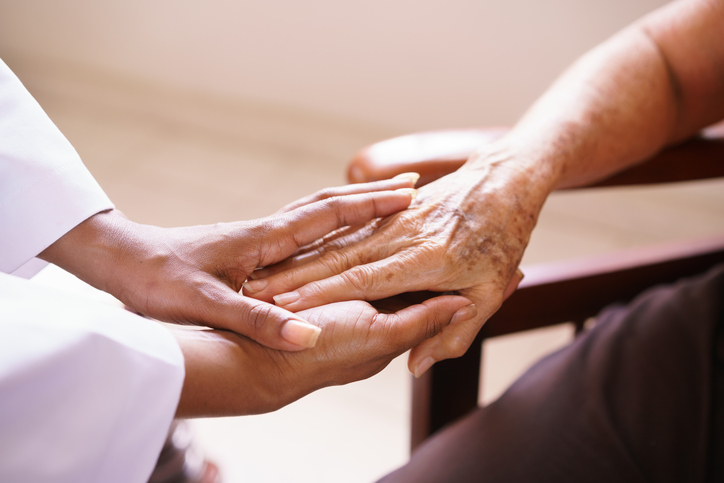It can be quite difficult for families and caregivers to witness the cognitive decline and associated memory loss in a loved one. Equally challenging is dealing with the increased dependency for support in undertaking everyday tasks that their loved one used to be able to complete on their own. As such, caring for a loved one with dementia can come with a unique set of challenges, and those caregivers require support so that they don’t fall ill or burn out.
In January 2016, Baycrest Health Sciences began to facilitate Online Dementia Caregiver Support Groups to provide enhanced care to family caregivers of dementia patients. Based on research initially developed by Dr. Elsa Marziali and her colleagues at Baycrest, these groups were offered as a clinical service utilizing the Ontario Telehealth Network (OTN) videoconferencing platform. The OTN’s platform allowed for the creation of a unique, secure and user-friendly video conferencing software.
Funding for the development of the program and two pilot tests was provided by The Robin and Barry Picov Family Foundation. Both online caregiver support groups included six to eight caregivers who met with a social work facilitator once a week for eight to ten weeks.
The online caregiver support groups were offered to adult children of a parent who had developed dementia under the age of 65, and to spousal caregivers of persons with Frontal Temporal Dementia (FTD). Group members shared their challenges and experiences, exchanged ideas, offered encouragement, solved problems and received therapeutic support from the social worker. Many of the group members expressed their appreciation and relief at having a platform to connect with others who were experiencing similar challenges.
“The Online Dementia Caregiver Support Group is a prime example of how Baycrest Health Sciences is finding innovative ways to help caregivers provide better management of complex chronic conditions for older adults with dementia living at home,” said Renee Climans, Social Worker for Baycrest Health Sciences.
Once the initial 10 week professionally facilitated group ended, participants were provided with the opportunity to continue as a self-sufficient peer led group. Both groups chose to continue meeting independently, with the first group meeting in person and the FTD Spousal Online Group meeting weekly on the OTN platform.
Jill, a caregiver, had the following to say about her experience in the support group. “The opportunity to participate in the online Dementia Support Group was life changing for me. A diagnosis of Frontotemporal Dementia changes everything in your life. You question the past, fear the future and just try to make it through each day. There is a new normal that only a few close family and friends see. The group was the first time I felt I “fit” in again. Meeting others who truly understand what each day is like as a caregiver of someone with Frontotemporal Dementia is a great comfort and can give you hope for the future. Through face to face contact you create a lasting personal connection.”
Jill went on to say, “By participating in this group I learnt I had a choice to make while on this journey. I could find the positives (help others, raise awareness, start a program to help those with young onset) or I could allow the huge list of negatives to control the days ahead. It is a gift to be able to ask questions and get honest answers from others in the group with life experience. The knowledge, guidance, kindness and resources Renee Climans provided for us were so supportive. The laughter and tears we shared during the 10 weeks were so heartfelt that there was no question that the group would continue on our own. The women I have met will always hold a very special place in my heart, and have made me realize I am not on this journey alone.”
The program has continued to be instrumental in helping to connect family caregivers facing similar challenges. Caregivers have been able to share helpful strategies for improving quality of life for both the family care provider and the person with dementia, and as a result try to help decrease premature institutionalization of people affected by dementia.
Maureen, another caregiver participant, stated the following: “We have extended the parameters of our online caregiver support group to include meaningful respite for all – the loved one and the caregiver. Respite from my point of view is not a day off but a change of pace, engaging in activities that adults of our stage in life are interested in doing. The support offered in this context comes through the respect, and acceptance of others — and recognition that the job may be hard but we are not alone nor are we expected to do it alone. If help is needed it is there -no question or judgements.”
Maureen goes on to say: “Our loved ones also enjoy doing the activities that accent their adult status and are easily worked into our daily routines. This is so important to everyone feeling comfortable and is often missed in institutions that see the illness and not the person inside. Our social groups now extend beyond those we meet at the multiple medical appointments we often attend each month, and we have fun times to look forward to. Thanks so much for initiating this group.”
Recruitment for further groups is currently underway, with a focus on reaching out to adult children of Young Onset Dementia (YOD) parents and YOD/FTD spouse/partners. Social workers have been provided the opportunity to observe live online groups with the goal to offer online support groups in their clinical areas. Additional funding opportunities will benefit further development of this program and capacity building interprofessionally.
The Online Dementia Caregiver Support Groups will help to enhance knowledge translation to other care partners and achieve peer recognition.
For more information, please contact Renee Climans.


